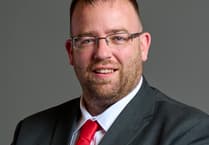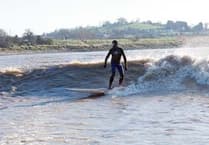I suppose that most people have in the recesses of their minds a golden age, probably as much imagined as real, when they were young and vigorous, bounding with health and intellectual vitality, in a world where the sun always shone. My golden age at one time was my time at university, but this was easily beaten by the extraordinary four years of my first move to the Forest of Dean in the early 1970s.
My migration from London to St Briavels at that time was intended to give me a break from the frantic pace, grim hostility and depressing anonymity of the metropolis, and to introduce me to a tranquil, rustic way of life.
After a casual visit to Bream rugby club I was soon resuming a rugby career that I thought was over, and in social, if not in playing terms, that was the best club I ever played for, and my playing career includes clubs in Scotland, north east England, London, Sussex and Papua New Guinea. The only disadvantage was that as I was not an original Forest boy, I did not have a proper Forest name, and I had to make do with ‘Dave’ or ‘Kenterrrrr’, envying those unforgettable characters rejoicing in authentic Forest names like ‘Biter’, ‘Lampy’, ‘Sponge’ or ‘Pudding’.
There was a Wye Valley Sunday afternoon football league at the time, so I was able to combine rugby on Saturday for Bream with goalkeeping for St Briavels on Sunday, and when summer came round, I found a place in St Briavels Cricket Club, bowling ill-directed slow-medium full tosses, until they put me behind the stumps as wicket keeper. The disused stables at the back of my house became re-used for keeping horses, a hopeless dream in London.
The headquarters of the village cricket club in those days was the now sadly defunct Crown Inn. It was my idea of a real village pub, cosy, lively and friendly, great for celebrating a cricket match or to enjoy a Sunday evening sing-along, after the mainly soulless pubs of London.
But the George, now the sole surviving pub in the village, was the place to be at 6pm during the week, and in this early evening shift, which frequently extended to a late evening shift, there gathered a rare group of amusing, interesting and intelligent people. Lawyer Geoff Vaughan Williams and television personality John Morgan – both, alas, subsequently victims of cancer – would be there, and under the genial chairmanship of landlord Roy Welsh, stimulating and lively conversation and disputation could be guaranteed on matters political, cultural, sporting or political.
There were even more politics to discuss in those days than there is now, with two general elections in 1974, a referendum on the Common Market (as it then was) in 1975, and Harold Wilson’s abrupt resignation as Prime Minister in 1976.
Conversations could easily turn to music, books, or such important matters as England’s chances of regaining the Ashes or the composition of the British Lions rugby squad to tour South Africa. We were an eclectic group. As well as John and Geoff, we had builders, entrepreneurs, a member of the House of Lords, car mechanics, computer specialists, teachers, and other members of the St Briavels underworld.
There were lots of parties, quite a few broken marriages, and a pace of life quite unsustainable for more than a couple of years, but while it lasted it was great fun.
And the sun (nearly) always shone. 1973, 1975 and 1976 were three of the sunniest years in the 20th Century. Even a rainy 1974 could not spoil my golden age.





Comments
This article has no comments yet. Be the first to leave a comment.